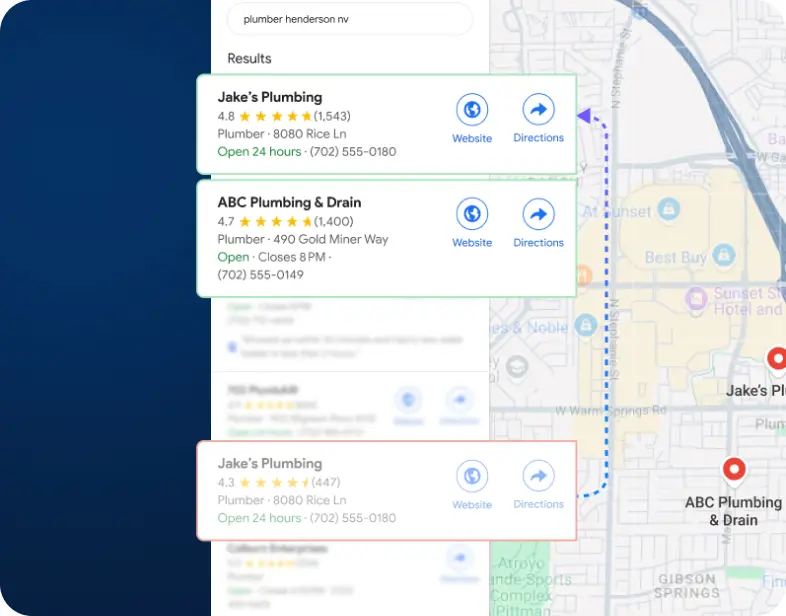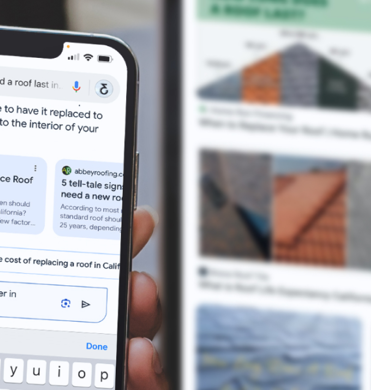If you’ve landed on this page, it’s likely you’ve heard about SEO, or search engine optimization, but might not be sure exactly how it works or why it’s so important. Maybe you’ve even invested in SEO to help your website rank higher, but you’re still unsure if it’s really worth the effort.
Let’s take a look at some compelling stats:
- Over 50% of website traffic comes from organic search results on Google and other search engines, like Bing/Yahoo.
- 68% of online experiences start with a search engine.
- 89% of marketers say SEO is successful in achieving their goals.
For businesses across nearly all industries—whether you’re in healthcare, law, home services, or retail—SEO has become a crucial part of online marketing.
So, how do you get started with SEO?
In this guide, we’ll walk you through the basics of SEO, explain how it works, and show you exactly how to begin improving your website’s ranking.
Over 50% of website traffic comes from organic search results… SEO isn’t optional—it’s essential for business growth.
What Is SEO?
Search engine optimization, or SEO, is the practice of improving your website to make sure it shows up in search results on engines like Google, Yahoo, and Bing. Essentially, it’s about making your site more visible when potential customers search for what you offer.
The great thing about SEO is that it’s an organic strategy. This means you don’t have to pay for ads to get your site in front of people. Instead, you “optimize” your website so that it naturally ranks higher in search results. Of course, you might hire an expert or use tools to help with this, but it’s not required.
There are several types of SEO to consider, such as technical SEO, local SEO, mobile SEO, and on-page SEO. Each one plays an important role in improving your site’s performance—but don’t worry; we’ll explain what each one is and what it involves.
How SEO Works: The Basics
Before we dive into how to get started with optimizing your website for search engines, it helps to understand the fundamental elements of SEO.
What Are SERP Features?
When you search for something on Google, you’ll notice that some results stand out more than others. These are called SERP features (search engine results page features), and they are key to getting noticed in search results.

Here are a few common ones:
- Rich Snippets: These show extra information, like star ratings or product prices directly in the search results.
- Featured Snippets: These appear at the very top of the search results, providing a direct answer to a query—no need for the user to click through to the website.
- Image Packs: These are groups of images that appear at the top or in the middle of search results.
- People Also Ask: A section that shows related questions users might be asking, helping to give even more context.
- Knowledge Graph: This box on the right side of search results displays quick information about people, businesses, or places.
What Factors Influence Search Rankings?
Search engines like Google use over 200 factors to determine where a website should appear in search results.
Here are some of the most important ones:
- Domain Factors: This includes domain authority, age, and history.
- Page-Level Factors (On-Page SEO): Keywords in titles, descriptions, and headings matter, along with content quality and page updates.
- Site-Level Factors (Technical SEO): Site architecture, mobile optimization, and speed all play a role.
- Backlinks: Backlinks are links from other reputable websites to yours.
- User Interaction: This includes metrics like how often people click on your site, how long they stay, and how they engage with your pages.
In simple terms, you’ll want to focus on creating high-quality, engaging content, improving your site’s speed, ensuring it’s mobile-friendly, and earning trusted backlinks to help increase your ranking.
68% of online experiences start with a search engine.
How to Get Started with SEO
SEO doesn’t offer instant results—it’s a long-term commitment. But over time, as you continue to refine your approach, you’ll start to see positive changes.
Here’s a breakdown of what you can do to get started:
Keyword Research & Optimization
Start by identifying the right keywords. These are terms and phrases that your potential customers are likely searching for. For small and mid-sized businesses, focus on long-tail keywords (multi-word phrases) that are easier to rank for. For example, if you own an HVAC business, you might want to focus on keywords like “heating repairs near me” or “air conditioner installation.”
Once you’ve chosen your keywords, make sure to incorporate them naturally into your content. This includes your page titles, meta descriptions, and even image alt-text. You’ll also want to add semantically related keywords to help search engines better understand the topic of your content.
For businesses with a local focus, don’t forget to include your location in your keyword strategy. So, instead of simply using a keyword like “AC repair,” use “AC repair in [your city]” to help your site show up in local customer’s searches.
Write High-Quality Content
High-quality content is one of the most important factors in ranking well on search engines. Write content that’s valuable to your audience, provides useful information, and is easy to read.
Search engines reward content that resonates with users, so make sure it’s not only optimized for keywords but also engaging and helpful. The more comprehensive and in-depth your content, the better.
Build Links
Link-building is a powerful SEO strategy, though it can be tricky to navigate. Instead of relying on spammy tactics, aim for natural backlinks.
Here are some ideas for getting more natural backlinks:
- Guest blogging
- Collaborating with other businesses
- Promoting your content on social media
Earning backlinks helps you build credibility and increase your rankings, but remember, low-quality links from irrelevant or spammy websites can hurt your site.
Optimize Technical SEO
Don’t overlook the technical aspects of SEO. Make sure your website is easy to navigate, mobile-friendly, and quick to load. Regularly monitor for broken links, page speed issues, and errors in your site’s structure.
89% of marketers say SEO is successful in achieving their goals.
Track & Measure Your Results
SEO is a long-term game, so it’s important to track your progress. You can use tools like Google Analytics and Google Search Console to see which keywords are bringing in traffic and how users are interacting with your site.
Regularly check metrics like your keyword rankings, organic traffic, and the bounce rate to get an idea of what’s working and where there’s room for improvement.
Useful SEO Tools
There are several tools available to help make your SEO efforts more effective:
- Scorpion: Our platform includes AI-powered tools to help you track and improve your SEO strategy.
- Google Keyword Planner: Google Keyword Planner is great for researching which keywords to target for your business.
- Ahrefs: Ahrefs lets you easily research keywords, analyze competitors, and check your backlinks.
- Google Search Console: With Google Search Console, you can track how your site is performing in search results.
- Google Analytics: Google Analytics provides insights into how users are interacting with your site.
- SEMrush: SEMrush is another useful tool for keyword research, site audits, and competitor analysis.

How Scorpion Can Help You Rank Faster
At Scorpion, we use Ranking AI, a powerful machine-learning tool that tailors SEO strategies to your specific business.
Here's how it works:
- Custom Strategies: We use our expertise and artificial intelligence (AI) to create a personalized SEO strategy based on your unique business and goals.
- Industry Focus: We have multiple teams that specialize in various industries, including yours, so we understand what it takes to succeed.
- Data-Driven Decisions: With Ranking AI, every SEO action is backed by insights from over 400,000 data points for each keyword.
SEO may seem complex at first, but once you understand the basics and start implementing the right strategies, it becomes a lot easier. The key is consistency and finding the right tools and support.
At Scorpion, we’re dedicated to helping local businesses succeed online. From SEO and website optimization to content creation and lead management, we’ve got the tools and expertise to help you grow.
Contact us today to learn more about how we can improve your SEO strategy and help your business thrive.




.0000000000000.png)

